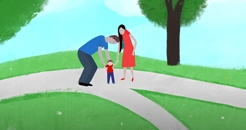 The importance of the first few years: one family's story
The importance of the first few years: one family's story
From a video by For Baby's Sake Trust
For Baby's Sake provide parents with support to break the cycle of domestic abuse and give their baby the best start in life. Here is the story of one family:
The first few years of life are incredibly important. Who you are as a person is largely shaped during these formative years.
Mother: Both my mum and dad probably had their own challenges growing up; certainly, my mum did. Things would be good for a while, then bad, and the cycle would repeat. I learned to be quiet and keep things inside, escaping into my imagination where I felt alive.
Father: My dad was an alcoholic, very angry, and very depressed. This created a lot of instability in our home. As a teenager, I became a delinquent, stealing cars, selling drugs, and generally making a nuisance of myself.
Then, we met.
Mother: It was like something out of a movie; our bond turned the world upside down.
Father: Within two months, she was pregnant. We both went into panic mode.
Mother: We stressed about being homeless and pregnant, and where we would get the money. Our arguments became severe, and one day, he put his hands around my neck until I couldn’t breathe.
This led us to the “For Baby’s Sake” program. We entered the programme.
Mother: The practitioner helped me find clarity, even though it triggered me into a very dark place.
Father: We were dealing with domestic abuse, but it didn’t feel like finger-pointing. The therapist was respectful, listened carefully, and helped me come up with practical solutions to work through my self-destructive patterns and make peace with the past.
We put tools in place to keep both of us safe. At every stage, we had someone trained and knowledgeable explaining what our baby was going through. This gave us space to figure out our relationship.
Mother: The programme allowed me to heal and come into myself. It gave me the confidence to be a good mum. Our child has two parents who are committed to being the best they can be.
Father: I can now live a more stable life and have a family. Our son has had the best start in life, something that hasn’t happened in my family for as far back as anyone can remember. It has been life-changing.
Watch this 3 min video:
Some background
Adverse Childhood Experiences, commonly known as ACEs, are stressful or traumatic events that occur during childhood. These events can range from physical, emotional, or sexual abuse to neglect and household dysfunction. The impact of these traumatic experiences is profound and long-lasting, often shaping an individual’s physical, mental, and emotional health throughout their life.
Traumatic events in the earliest years of infancy and childhood are not easily forgotten. Much like a child’s footprints in wet cement, these experiences are often preserved for a lifetime. Time does not heal the wounds that occur in those earliest years; instead, it conceals them. These traumas are not lost but embodied, influencing the root of many physical, mental, and emotional conditions.
Exposure to multiple traumatic events during childhood can have significant implications on how an individual lives their life. Our behaviours, thoughts, and feelings may be linked to these unacknowledged traumas, creating emotions such as shame, worthlessness, depression, and anger. Dissociation, a natural response to traumatic experiences, occurs more intensely in response to prolonged and repeated trauma. This is when the brain disconnects from what is happening to escape distress, often leading to the creation of subconscious fantasies.
Emotional vulnerability can bring up feelings of being exposed, judged, hurt, humiliated, and shamed. Infancy and early childhood are critical developmental periods when emotional development is particularly malleable and highly affected by trauma exposure. Unhelpful coping strategies may be adopted to deal with unresolved issues, resulting in feelings of worthlessness, loneliness, and a fragile sense of self.
One common coping mechanism for not feeling worthy of love is to distance oneself from loving relationships. Unfortunately, if trauma isn’t processed, the cycle continues, often resulting in emotionally unavailable parenting. This perpetuates the cycle of trauma across generations.
However, there is hope. Through acceptance, empathy, and a therapeutic relationship, individuals can begin to tell their stories and process their trauma histories. This inward journey of discovery is essential for supporting recovery, sustainable change, and providing opportunities for future generations. By breaking the cycle, we can create a healthier, more resilient society.
Retweet about this article:
From a video by For Baby's Sake Trust, 27/11/2024